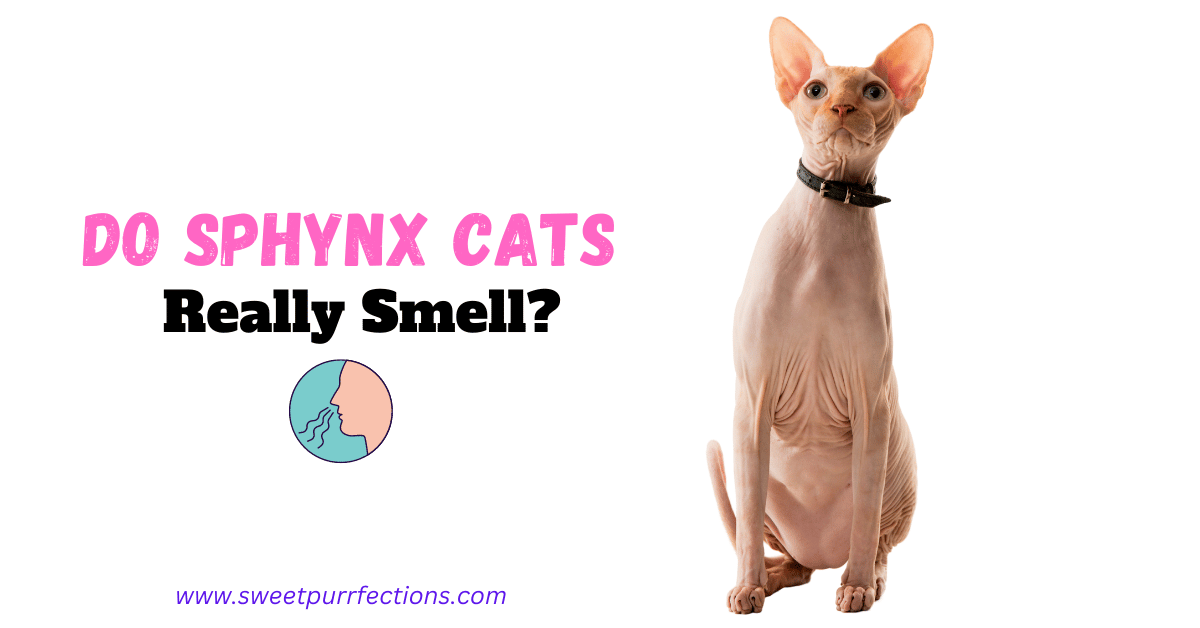This post contains affiliate links and I will be compensated if you make a purchase after clicking on my links.
How Much Do Sphynx Cats Smell? Debunking Odor Myths
Sphynx cats, known for their distinctive hairless appearance and large ears, often carry a reputation for being smelly. However, the truth is more nuanced.
These cats typically emit a mild, earthy odor—often compared to mushrooms or yeast bread—that is not overwhelming but rather a unique aspect of their charm. This scent mainly arises from their exposed skin, which directly accumulates oils and sweat that would usually be absorbed by fur.
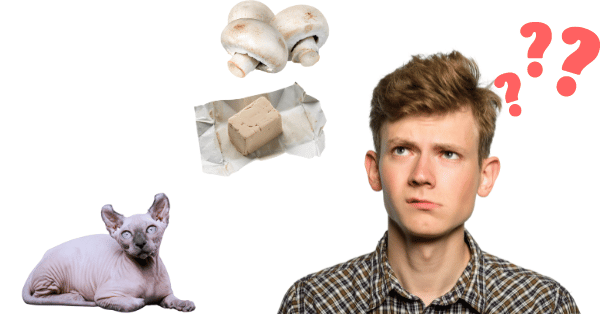
Without the usual fur barrier, dirt and bacteria can more readily build up, potentially leading to a stronger smell if not managed properly. While they do have a distinct smell compared to other cats, it should not be unpleasant.
Pro Tip: Owners should be aware, though, that a sudden increase in odor intensity could signal health issues, emphasizing the need for vigilant care and possibly veterinary attention if significant changes in scent are observed.
Top Health Reasons Why Sphynx Cats Might Smell
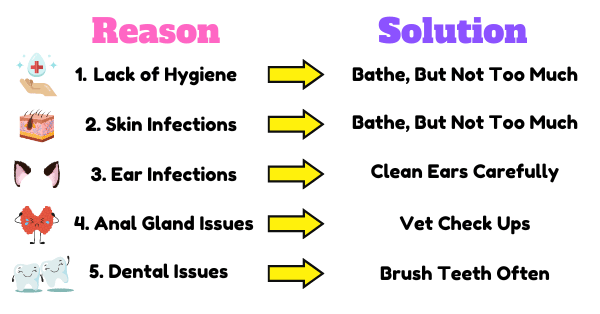
1. Lack of Hygiene
For hairless breeds like the Sphynx, the lack of fur does more than define their appearance—it directly influences their hygiene needs. Just like how humans would start to smell if they didn’t bathe regularly, Sphynx cats accumulate natural body oils on their skin, which attracts dirt and bacteria. This buildup is a primary reason for the noticeable body odor typical in such breeds.
2. Skin Infections
Sphynx cats’ hairlessness leaves their delicate skin vulnerable to infections, which can produce a foul smell along with redness, itching, sores, and bumps. Such conditions typically require veterinary intervention to manage the bacteria responsible for the unpleasant odors.
3. Ear Infections
Sphynx cats are susceptible to ear infections due to the lack of hair in their ears, which leads to an increased buildup of earwax compared to other breeds.
This accumulation of dirt, dust, oils, and other debris can quickly result in bacterial infections, emitting odors that range from musty to sweet. Factors such as allergies, tumors, improper cleaning, or mite infestations from other animals can also trigger these infections.
The specific type of bacteria or yeast involved influences the odor. If your Sphynx’s ears appear smelly, itchy, or inflamed, prompt treatment is crucial. This usually includes antibiotics or antifungals to manage the infection and alleviate discomfort.
4. Anal Gland Issues
Sphynx cats like other cats rely on their anal glands for communication, secreting a substance used to mark their territory. If these glands become impacted or infected, they can fail to empty naturally, resulting in unpleasant odors and potential health problems. Common issues include impaction and infection, often exacerbated by inadequate bowel movements.
5. Dental and Oral Health Issues
Oral health issues like tooth decay, gum infections, and oral tumors can lead to bad breath in Sphynx cats. This problem can be compounded by systemic diseases such as diabetes mellitus, which might make their breath smell sweet or fruity, or kidney disease, which can give off a urine or ammonia scent.
As Sphynx cats groom themselves, the odor from their mouth can transfer to other parts of their body, contributing to an overall smell.
Fact: Be alert to scent changes in your Sphynx cat. Other health issues, such as kidney disease or diabetes, can significantly impact their natural fragrance, signaling potential medical concerns.
How to Prevent Odor in Sphynx Cats
Grooming is the starting point—not only does it prevent odor, but it also plays a crucial role in overall health and strengthens the bond with your Sphynx, who especially loves attention.
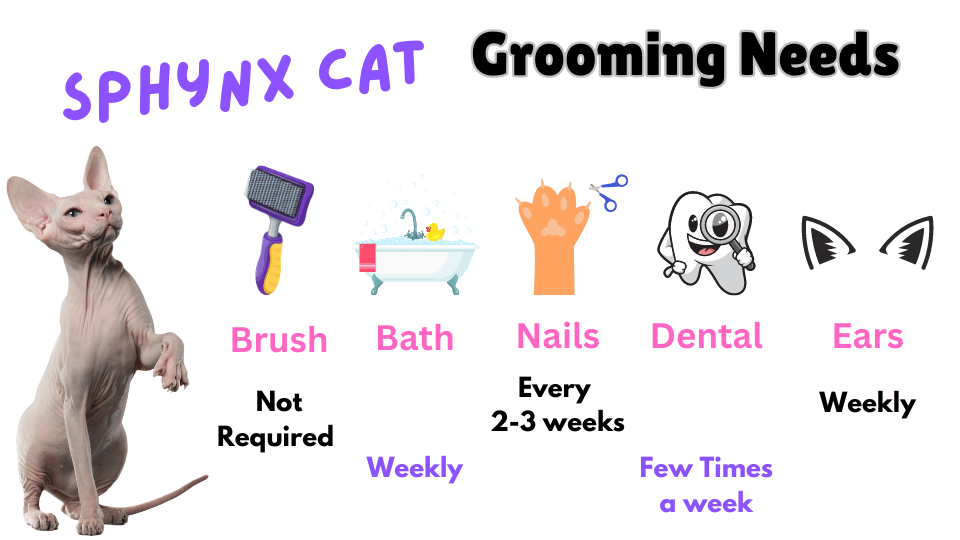
1. Bathe Them Often Enough (But Not Too Much)
While most cats typically turn their whiskers up at the thought of bath time, Sphynx cats, with their hairless uniqueness, actually require a regular dip to keep them looking and feeling their best.
To effectively manage their skin care, bathe your Sphynx weekly using warm water, which helps break down and wash away excess oil and dirt. Opt for a mild, conditioning shampoo to cleanse without stripping their skin of necessary moisture. For those Sphynx with particularly dry skin, a gentle conditioner might be a better option than shampoo.
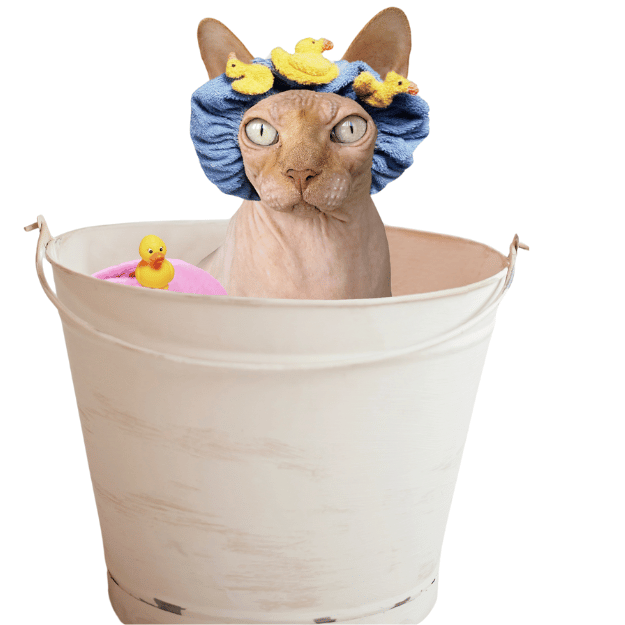
Remember, thorough drying is crucial, as their lack of fur means they don’t have natural insulation to keep warm. Also, steer clear of human shampoos—the pH balance is all wrong for their delicate skin and can lead to irritation.
If your Sphynx feels a bit greasy between baths, a quick wipe-down with a damp washcloth or a spritz of waterless cat shampoo can freshen them up without the full bath routine.
2. Clean Their Ears
To keep your Sphynx cat’s ears clean and odor-free, establish a weekly cleaning routine. Gently wipe the visible parts of the ears with a cotton ball. For areas closer to the ear canal but still visible, use q-tips or cotton buds with care, ensuring not to enter the ear canal itself. If needed, apply a vet-recommended ear cleaner to help dissolve and remove excess wax and debris effectively.
3. Trim Their Nails Regularly
Like most cat breeds, Sphynx cats require regular nail checks every 2-3 weeks to prevent overgrowth that can scratch their sensitive skin and lead to infections. Use nail clippers and a file to carefully trim their nails, always checking for any signs of injury.
While scratching posts and cat trees help maintain claw health, they don’t sufficiently wear down the nails, making regular trimmings a necessity for keeping your Sphynx cat comfortable and infection-free.
4. Teeth Brushing
Optimal dental health in Sphynx cats requires daily attention. Aim to brush their teeth daily with a soft brush and cat-specific toothpaste to prevent plaque and tartar buildup, which can lead to dental issues and bad breath. If daily brushing isn’t feasible, ensure at least a weekly session.
Additionally, support their dental health with chews, toys, and special foods designed for oral hygiene, helping to keep their teeth healthy and their breath fresh.
5. Clean Their Environment
A clean cat needs a clean living space. Regularly wash your Sphynx cat’s bedding and clean surfaces they frequently touch to prevent odors from lingering or spreading. This ensures that your efforts in grooming your cat are complemented by a fresh, clean environment.
6. Provide a Balanced Diet for Optimal Health
A healthy, balanced diet is crucial for your Sphynx cat, especially due to their sensitive digestive systems. High-quality food not only supports their skin health and immune system but also plays a significant role in reducing odors and promoting overall wellness.
It’s important to avoid foods with low-quality ingredients, as these can lead to food intolerances, resulting in diarrhea and foul-smelling waste. Be cautious of fillers and artificial preservatives, which can damage their kidneys and contribute to unpleasant odors.
Additionally, understanding and avoiding foods that trigger allergies is essential, as allergic reactions can cause skin issues, leading to infections that may produce bad smells.
7. Supplement Their Diet with Essential Fatty Acids
Incorporating supplements rich in essential fatty acids, like Omega-3, can significantly benefit your Sphynx’s skin and joint health. Many supplements are fish-oil based, making them appealing to cats, and are available in various forms to easily add to your cat’s diet. These nutrients help maintain smooth, hydrated skin, reducing the risk of dryness and irritation that can contribute to unpleasant odors.
Keep Your Sphynx Cat Healthy and Odor-Free: Key Takeaways
If you’ve followed all these steps and your Sphynx cat is still smelly, it’s time to visit the vet. There could be an underlying health issue that needs attention.
Sphynx cats, despite being hairless, are actually more high-maintenance than their furry counterparts. Without fur to absorb body oils, these oils can build up on their skin, leading to greasiness and odor, making regular bathing a must.
Beyond grooming, protecting their sensitive skin from the sun is crucial—always use cat-specific sunscreen or opt for protective clothing like coats and jumpers, especially in colder climates. Remember, keeping your Sphynx cat clean and healthy requires a bit more effort, but the bond you share with your unique pet makes it all worthwhile.
Worried about keeping your Sphynx cat smelling fresh? Head over to our Hairless Cat Products Page to find the perfect grooming supplies and odor-control products. From gentle shampoos that tackle oil build-up to stylish sun-protective gear, ensure your Sphynx stays clean, healthy, and odor-free with the right tools at your fingertips.

